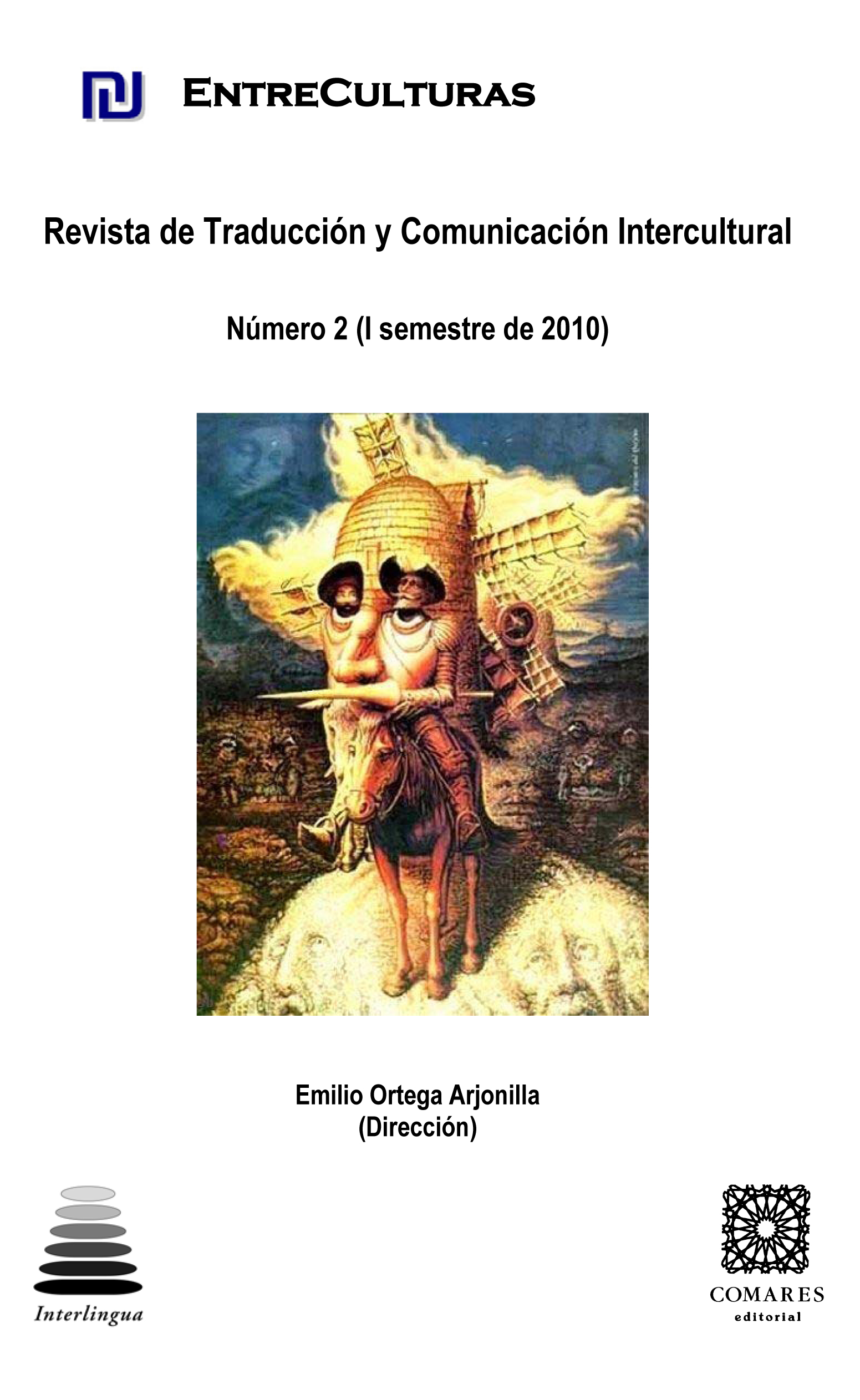ELE PARA FINES ESPECÍFICOS: EL ESPAÑOL DE LA ECONOMÍA, EL COMERCIO Y LA EMPRESA
DOI:
https://doi.org/10.24310/Entreculturasertci.vi2.11769Keywords:
specialized language, learning, lexicon of economical, textbooks, teaching stylesAbstract
We analyze four styles of textbooks for the teaching and learning of Spanish as a foreign language (ELE) within the economy, the enterprise and the trade. The presentation is performed through 4 particular examples of textbooks, each one representative of a type. We will see how they are organized, which techniques they use to teach the vocabulary, the defects and the advantages of each of them.
Downloads
Metrics
References
AGUIRRE, B y C. FERNÁNDEZ (1987): Curso de español comercial. Madrid, SGEL.
BALBONI, P. (1998): “Problemi di comunicazione interculturale in ambiente aziendale e commerciale” en I jornades catalanes sobre llengues per a finalitats especìfiques. Barcelona, Publicacions de la Universitat de Barcellona, 27-33.
CABRÉ CASTELLVÍ, M. T. (1993): La terminología. Teoría, metodología, aplicaciones. Barcelona, Antártida.
CENTELLAS, A. (2002): Proyecto en… español comercial. Madrid, Edinúmen.
CERVERO, Mª J. y F. PICHARDO CASTRO (2000): Aprender y enseñar vocabulario. Madrid, Edelsa.
CLYNE, M. (1994): Inter-Cultural Communication at Work, Cultural Values in Discourse. Cambridge, C.U.P.
RAE (1992): Diccionario de la Real Academia de la lengua Española. Madrid, Espasa Calpe.
FAJARDO, M. & S. GONZÁLEZ (1995): Marca registrada. Madrid, Universidad de Salamanca y Santillana.
FELICES LAGO, Á.M & C. RUIZ LÓPEZ (1998): Español para el comercio internacional. Madrid, Edinúmen.
FELICES LAGO, Á.M. (2000): “Claves sociales y culturales para comprender y enseñar la terminología de la economía sectorial española”. Espéculo, 15 [en línea]: www.ucm.es/especulo/ele.
GARCÍA SANTA CECILIA, Á. (2000): Cómo se diseña un curso de lengua extranjera. Madrid, Arco Libros.
GARZONE, G. (2001): “Mediazione e interculturalità lingu?ística nell'ambiente aziendale”. Culture. Annali dell'Istituto della Facoltà di Scienze Politiche dell'Università degli Studi di Milano. Milano, Montedit.
GÓMEZ DE ENTERRÍA, J. (2001): La enseñanza/aprendizaje del español con fines específicos. Madrid, Edinumen
GONZÁLEZ, M. et al. (1999): Socios. Barcelona, Difusión.
HUTCHINSON T. y A. WATERS (1987): English for Specific Purposes. Cambridge, Cambridge University Press.
LLOBERA, M. (2000): “Aspectos semióticos del discurso en la enseñanza de EpFE: ideaciones y dimensión educativa” en Español para fines específicos Actas del I CIEFE I Congreso internacional de español para fines específicos. Ámsterdam, Ministerio de Educación, Cultura y Deporte.
MARTÍN, A. M. et al. (1989): El español de los negocios. Madrid, SGEL.
MONTALTO CESSI, D. (1998): “Los lenguajes específicos” en M. V. Calvi & F. San Vicente (eds): La identidad del español y su didáctica. Viareggio, Il lume a petrolio.
MUÑOZ SORO, F. J. (2003): “L'insegnamento della lingua e cultura spagnola nelle facoltà di scienze politiche in Italia”. Giornate di studio sui materiali didattici per l'insegnamento delle lingue straniere, Firenze 12-14 Maggio, 2003, Facoltà di Lettere e Filosofia, Università degli studi di Firenze.
SAN VICENTE, F. (2000): “La enseñanza / aprendizaje del español de las ciencias sociales en entorno multimedia”. Espéculo, 15 [en línea]: www.ucm.es/info/especulo
Downloads
Published
How to Cite
Issue
Section
License
All contents published in Entre culturas. Revista de traducción y comunicación intercultural are protected under the Creative Commons Attribution-NonCommercial-ShareAlike 4.0 International (CC BY-NC-SA 4.0) license. All about this license is available in the following link: <http://creativecommons.org/licenses/by-nc-sa/4.0>
Users can copy, use, redistribute, share and exhibit publicly as long as:
- The original source and authorship of the material are cited (Journal, Publisher and URL of the work).
- It is not used for comercial purposes.
- The existence of the license and its especifications are mentioned.
There are two sets of authors’ rights: moral and property rights. Moral rights are perpetual prerogatives, unrenounceable, not-transferable, unalienable, imprescriptible and inembargable. According to authors’ rights legislation, Entreculturas. Revista de traducción y comunicación intercultural recognizes and respects authors moral rights, as well as the ownership of property rights, which will be transferred to University of Malaga in open access. The property rights are referred to the benefits that are gained by the use or the dissemination of works. Entreculturas. Revista de traducción y comunicación intercultural is published in an open access form and it is exclusively licenced by any means for doing or authorising distribution, dissemination, reproduction, , adaptation, translation or arrangement of works.
Authors are responsable for obtaining the necessary permission to use copyrighted images.





7.png)
